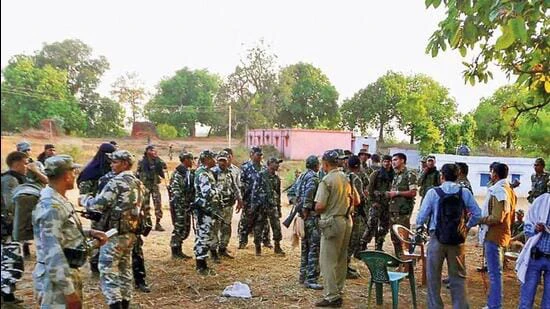The Chhattisgarh Police were probing the authenticity of a purported statement of the outlawed Communist Party of India (Maoist) or CPI (Maoist) announcing a temporary suspension of its “armed struggle” and expressing willingness for peace talks with the central and state governments.
A police officer said that the statement circulating on social media does not appear to be in the usual Maoist language, and its authenticity is being verified.
Inspector general Sunderraj P said they have noted the statement issued in the name of the CPI (Maoist) Central Committee regarding the laying down of arms and the prospect of peace talks. “The authenticity of this release is being verified, and its contents are under careful examination.”
He said any decision on engagement or dialogue with the CPI (Maoist) lies solely with the government, which will take an appropriate call after due consideration and assessment of the situation and circumstances.
The purported statement issued in the name of CPI (Maoist) spokesperson Abhay was issued on August 15 but went viral on Tuesday evening. It said that the organisation is ready to “join the mainstream” and participate in mass struggles to resolve people’s issues.
The Maoists claimed they had made “serious and sincere efforts” since March 2025 to initiate peace talks with the government. They cited a previous ceasefire offer and alleged that the central government did not respond positively and intensified counter-insurgency operations in January 2024.
The statement referred to the killing of CPI (Maoist) general secretary Basavaraj and 28 members of his security detail. “Despite these circumstances, we have decided not to abandon the process of peace talks midway, and to move forward with it in line with his vision,” the statement said. It added that they are willing to talk with the Prime Minister, Union home minister, chief ministers, their representatives, or any authorised delegation. “We will begin constructive peace dialogue with comrades of clear thinking and tolerance.”
The Maoists requested the government to give them one month to consult cadres across the country, including those in prison. The statement said they were prepared to hold preliminary exchanges with the government through “media blocks” and demanded that counter-insurgency operations be halted for a month as a confidence-building measure.
“The forests that are red with blood can only be turned into forests of peace if the government collectively takes this stand,” the statement said.
The outfit appealed to workers, Dalits, Adivasis, women, minorities, intellectuals, human rights activists, writers, artists, and members of the peace committee to understand the “changed circumstances” and extend support to its decision. It sought suggestions from Leftist organisations, progressive groups, and democratic forces, promising to accept and consider them.
The statement provided an email ID ([email protected]) and a Facebook account (nampetalk) for any views, but said these would only be accessed after the government expresses willingness to cooperate.
The statement said that comrades who cannot send their opinions within the one-month deadline should not worry, as suggestions could also be given during the course of talks. It asked imprisoned cadres to send their views with permission from jail authorities.
State committees, special area committees, zonal and sub-zonal committees have been asked to forward opinions through official spokespersons once a consensus is reached. The statement ended with “Revolutionary greetings”.
It has emerged amid the Union government’s target of eliminating Maoism from the country by next year and heightened anti-Maoist operations. Top Maoist leader Modem Bala Krishna was among around a dozen Left-wing insurgents killed last week in Chhattisgarh.
A June 23 Maoist Central Committee document acknowledged the killing of 357 Maoists over the last year. Basvaraju’s killing on May 20 marked the most significant success against the Left-wing insurgency in years.
Basvaraju, the backbone of the insurgency in central India, was accused of masterminding attacks, including an ambush that left 76 security personnel dead in 2010.
The Maoist movement began in 1967 in West Bengal’s Naxalbari village. It spread to what is now Chhattisgarh, Jharkhand, Bihar, Odisha, Andhra Pradesh, and Maharashtra. Maoism has been described as the biggest threat to India’s internal security. It has suffered setbacks, but retained the capacity to launch attacks.
